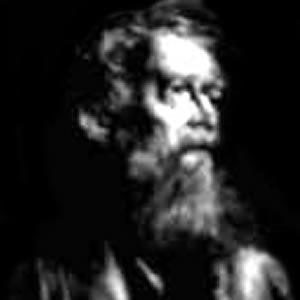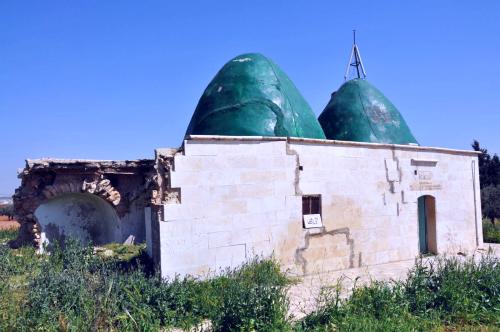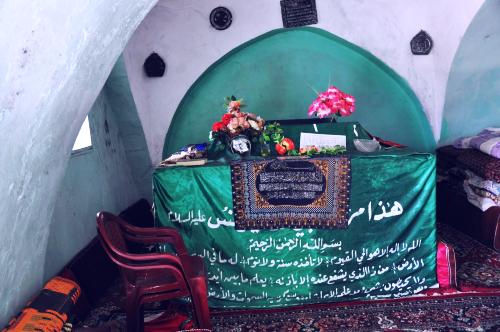
Jonah lived in Nineveh, close to Mosul in Iraq.
He was sent to a people that had forgotten God's orders and did many things which God had forbidden.Jonah found that people did not want to listen to him. He lost patience with them and left the town in anger and headed towards modern day Tunisia, but possibly ended up in Yafa.
Afterwards, Jonah decided to go across the sea, and boarded a ship for the voyage. But when the ship was in the middle of the ocean, Jonah suffered a great misfortune. He was thrown overboard and swallowed up by a whale.
After repenting to God, he emerged from fish alive three days later. He went back to his people in Iraq where all 100,000 of them repented and believed in him.
32779 views · 41 mins ago
 20:01
20:01
223
1531739730
1762665392
Jesus died and raised on 3rd day. Yet, Jonah was alive in the Whale? - Paul William vs Christian 1/2
001201
3
 34:29
34:29
202
1531739662
1762647004
Jesus died and raised on 3rd day. Yet, Jonah was alive in the Whale? - Paul William vs Christian 2/2
002069
4
Jonah in the Torah
Torah is the first 5 books* of the Old Testament: Genesis, Exodus, Leviticus, Numbers and Deuteronomy.Jonah in the Psalms
Psalms is the third section of the Hebrew Bible. Many of the Psalms are linked to David.Jonah in the Bible (Old Testament)
The Old Testament consists of 39 books* including the Jewish Torah (Genesis, Exodus, Leviticus, Numbers and Deuteronomy).Jonah in the Bible (New Testament)
The New Testament (Christianity) consists of 66 books*. 39 books from the Old Testament, and 27 additional books including Matthew, Mark, Luke and John.Jonah in the Quran
The Quran was revealed to Muhammad through the Angel Gabrial. It is the central religious text of Islam, which Muslims believe to be a direct revelation from God.Jonah in Hadith
Hadith are the "prophetic traditions" of Muhammad; his teachings, actions, deeds and sayings. Hadith were compiled from oral reports in circulation in society around the time of their compilation.The Prophet said, "One should not say that I am better than Jonah (i.e. Yunus) bin Matta." So, he mentioned his father Matta. The Prophet mentioned the night of his Ascension and said, "The prophet Moses was brown, a tall person as if from the people of the tribe of Shanu'a. Jesus was a curly-haired man of moderate height." He also mentioned Malik, the gate-keeper of the (Hell) Fire, and Ad-Dajjal.
The Prophet said, "None of you should say that I am better than Yunus (i.e. Jonah)." Musadded added, "Jonah bin Matta."
The Prophet said, "None has the right to say that I am better than Jonah bin Matta."
The Prophet said, "Whoever says that I am better than Jonah bin Matta, is a liar."
The Prophet said, "Nobody has the rights to say that I am better than Jonah bin Matta."
The Prophet said, "Nobody has the right to say that I am better than Jonah bin Matta."
Allah's Apostle said, "Nobody has the right to be better than (Jonah) bin Matta."
The Prophet said, "He who says that I am better than Jonah bin Matta, tells a lie.'
The Prophet said that his Lord said: "It does not befit a slave that he should say that he is better than Jonah (Yunus) bin Matta.
The Messenger of Allah (Peach be upon him) used to prostrate and sleep (in prostration) and produce puffing sounds (during sleep). Then he would stand and pray and would not perform ablution. I said to him: you prayed but did not perform ablution though you slept (in prostration). He replied: Ablution is necessary for one who sleeps while he is lying down. Uthman and Hannad added: For when he lies down, his joints are relaxed.
Abu Dawud said: The statement "ablution is necessary for one who sleeps while one is lying down" is a munkar (rejected) tradition. It has been narrated only by Yazid Abu Khalid al-Dalani, on the authority of Qatadah. And its earlier part has been narrated by a group (of narrators) from Ibn 'Abbas; they did not mention anything about it. He (Ibn 'Abbas) said: The Prophet (Peach be upon him) was protected (during his sleep). 'Aishah reported: The Prophet (Peach be upon him) said: My eyes sleep, but my heart does not sleep. Shu'bah said: Qatadah heard from Abu'l-'Aliyah only four traditions: the tradition about Jonah son of Matthew, the tradition reported by Ibn 'Umar about prayer, the tradition stating that the judges are three, and the tradition narrated by Ibn 'Abbas saying: (This tradition) has been narrated to me by reliable persons ; 'Umar is one of them, and the most reliable of them in my opinion is 'Umar. Abu Dawud said: I asked Ahmad b. Hanbal about the tradition narrated by Yazid al-Dalani. He rebuked me out of respect for him. Then he said: Yazid al-Dalani does not add anything to what has been narrated by the teachers of Qatadah. He did not care of this tradition (due to its weakness).
It is not fitting for a servent to say that I (The Prophet) is better than Jonah son of Matta.
It is not fitting for a prophet to say : I am better than Jonah son of matta.
Jonah in Ibn Kathir
Ibn Kathir (1300-1373) was an influential Muslim scholar/historian who wrote the reknowned 'Qisas Al-Anbiya' (Stories of the Prophets) book. An authorative and respected thesis on the many prophets of GodIMPORTANT NOTE: Ibn Kathir is NOT Revealed Scripture. It appears here as it contains relevant information
In the story of Prophet Yunus we learn that he was sent by Allah to a people that had forgotten Allah’s orders and did many things which Allah had forbidden. But Yunus soon discovered that the people did not want to listen to him. He lost patience with them and left the town in anger. Afterwards, Yunus decided to go across the sea, and boarded a ship for the voyage. But when the ship was in the middle of the ocean, Yunus suffered a great misfortune. He was thrown overboard and swallowed up by a whale.
Almighty Allah recounted: ” And, verily, Jonah was one of the Messengers. When he ran to the laden ship, he agreed to cast lots and he was among the losers, Then a big fish swallowed him and he had done an act worthy of blame. Had he not been of them who glorify Allah, he would have indeed remained inside its belly (the fish) till the Day of Resurrection. But We cast him forth on the naked shore while he was sick and We caused a plant of gourd to grow over him. And We sent him to a hundred thousand people or even more, and they believed; so We gave them enjoyment for a while. (Ch 37:139-148 Quran).
Prophet Jonah (Yunus) also known as Dhan-Nun. About his people Almighty Allah said: “Was there any town community that believed after seeing the punishment, and its Faith at that moment, saved it from the punishment? (the answer is none)–except the people of Jonah; when they believed, We removed from them the torment of disgrace in the life of the present world, and permitted them to enjoy for a while.” (Ch 10:98 Quran)
The inhabitants of the town of Nineveh were idolaters who lived a shameless life. Prophet Jonah was sent to teach them the worship of Allah. The people disliked his interference in their way of worship, so they argued. “We and our forefathers have worshiped these gods for many years and no harm has come to us.”
Ibn Abbas narrated: “The Muhammad said: ‘One should not say I am better than Jonah Ibn Matta.’” (Sahih Bukhari).
Try as he might to convince them of the foolishness of idolatry and of the goodness of Allah’s laws, the ignored him. He warned them that if they kept on with their foolishness, Allah’s punishment would soon follow. Instead of fearing Allah, they told Jonah that they were not afraid of his threats. “Let it happen,” they told him. Jonah was disheartened. “in that case, I will leave you to your misery!” so saying, he left Nineveh, fearing that Allah’s anger would soon follow.
“Remember Dhan Nun (Jonah), when he went off in anger, and imagined that We shall not punish him (the calamities which had befallen him)! (ch 21:87)
Hardly had he left the city when the skies began to change color and looked as if they were on fire. The people were filled with fear by this sight. They recalled the destruction of the people of ‘Ad, Thamud and Noah. Was theirs to be a similar fate? Slowly faith penetrated their hearts. They all gathered on the mountain and started to beseech Allah for His mercy and forgiveness. The mountains echoed with their cries. It was a momentous hour, filled with sincere repentance.
Allah removed His wrath and showered His blessings upon them once again. When the threatening storm was lifted, they prayed for the return of Jonah so that he could guide them.
Meanwhile, Jonah had boarded a small ship in the company of other passengers. It sailed all day in calm waters with a good wind blowing at the sails. When night came, the sea suddenly changed. A horrible storm blew as if it were going to split the ship into pieces. The waves looked wild. They rose up as high as mountains then plunged down like valleys, tossing the ship and sweeping over the deck.
Behind the ship, a large whale was splitting the water and opening its mouth. A command had been issued from Almighty Allah to one of the greatest whales of the sea to surface. It obeyed. The whale hurried to the surface of the sea and followed the ship as it had been commanded.
The tempest continued and the chief crewman asked the crew to lighten the ship’s heavy load. They threw their baggage overboard, but this
The captain directed: We will make lots with all of the travelers’ names. The one whose name is drawn will be thrown into the sea.” Jonah knew this was one of the seamen’s traditions when facing a tempest. It was a strange polytheistic tradition, but it was practiced at that time. Jonah’s affliction and crisis began.
Here was the prophet, subjected to polytheistic rules that considered the sea and the wind to have gods that riot. The captain had to please these gods. Jonah reluctantly participated in the lot, and his name was added to the other travelers’ names. The lot was drawn and “Jonah” appeared.
Since they knew him to be the most honorable among them, they did not wish to throw him into the angry sea. Therefore, they decided to draw a second lot. Again Jonah’s name was drawn. They gave him a final chance and drew a third lot. Unfortunately for Jonah, his name came up again.
Jonah realized that Allah’s hand was in all this, for he had abandoned his mission without Allah’s consent. The matter was over, and it was decided that Jonah should throw himself into the water. Jonah stood at the edge of the ship looking at the furious sea. It was night and there was no moon. The stars were hidden behind a black fog. But before he could be thrown overboard, Jonah kept mentioning Allah’s name as he jumped into the raging sea and disappeared beneath the huge waves.
The whale found Jonah floating on the waves before it. It swallowed Jonah into its furious stomach and shut its ivory teeth on him as if they were white bolts locking the door of his prison. The whale dived to the bottom of the sea, the sea that runs in the abyss of darkness.
Three layers of darkness enveloped him, one above the other; the darkness of the whale’s stomach, the darkness of the bottom of the sea, the darkness of the night. Jonah imaged himself to be dead, but his senses became alert when he found he could move. He knew that he was alive and imprisoned in the midst of three layers of darkness. His heart was moved by remembering Allah. His tongue released soon after saying:
” La ilaha illa Anta (none has the right to be worshipped but You (O Allah), Glorified (and Exalted) be You (above all that evil they associate with You), Truly, I have been of the wrong doers.” (Ch 21:87 Quran)
Jonah continued praying to Allah, repeating this invocation. Fishes, whales, seaweeds, and all the creatures that lived in the sea heard the voice of Jonah praying, heard the celebration of Allah’s praises issuing from the whale’s stomach. All these creatures gathered around the whale and began to celebrate the praises of Allah in their turn, each in its own way and in its own language.
The whale also participated in celebrating the praises of Allah and understood that it had swallowed a prophet. Therefore it felt afraid; however, it said to itself; “Why should I be afraid? Allah commanded me to swallow him.”
Allah Almighty saw the sincere repentance of Jonah and heard his invocation in the whale’s stomach. Allah commanded the whale to surface and eject Jonah onto an island. The whale obeyed and swam to the farthest side of the ocean. Allah commanded it to rise towards the warm, refreshing sun and the pleasant earth.
The whale ejected Jonah onto a remote island. His body was inflamed because of the acids inside the whale’s stomach. He was ill, and when the sun rose, its ray burned his inflamed body so that he was on the verge of screaming for the pain. However, he endured the pain and continued to repeat his invocation to Allah.
Almighty Allah caused a vine to grow to considerable length over him for protection. Then Allah Exalted caused Jonah to recover and forgave him. Allah told Jonah that if it had not been for his praying to Him, he would have stayed in the whale’s stomach till the Day of Judgment.
Gradually he regained his strength and found his way to his hometown, Nineveh. He was pleasantly surprised to notice the change that had taken place there. The entire population turned out to welcome him. They informed him that they had turned to believe in Allah. Together they led a prayer of thanksgiving to their Merciful Lord.
































